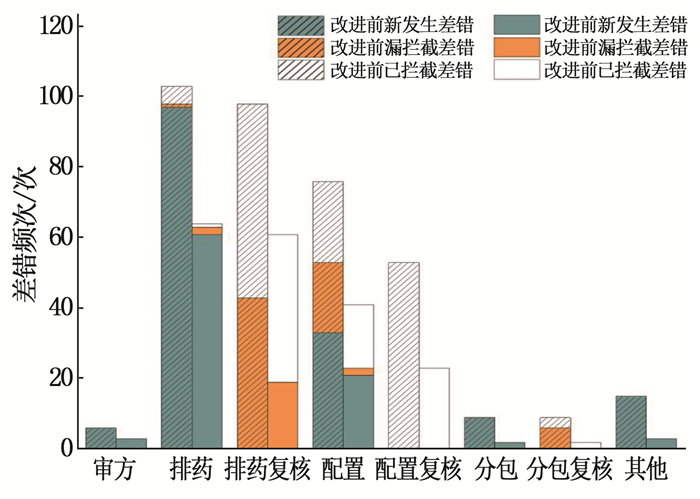A quantitative analysis of error risk and risk prevention in Pharmacy Intravenous Admixture Services
-
摘要:目的
总结分析静脉用药调配中心发生的差错, 探讨风险防范措施,以保障临床用药安全。
方法基于“瑞士奶酪模型”对2019—2020年安徽医科大学第一附属医院静脉用药调配中心各工作环节出现的差错进行回顾性分析,并提出相应防范改进措施。统计配置总袋数、差错袋数、差错频次、风险因素频次、差错总发生率、漏洞差错占比、漏洞系数、风险防范提升率等风险指标结果,比较改进前后静脉用药调配中心的差错发生情况。
结果改进后(2020年1—12月)的差错总发生率、漏洞差错占比分别为0.12‰、16.30%, 低于改进前(2019年1—12月)的0.16‰、31.30%, 差异有统计学意义(χ2=5.642、10.021, P=0.018、0.002)。改进后,漏洞系数由0.46降至0.19, 风险防范提升率为58.70%。
结论运用“瑞士奶酪模型”定义差错频次、漏洞差错占比、漏洞系数、风险防范提升率等风险量化指标,对静脉用药调配中心发生的差错及差错传导情况进行全面总结分析,制订并实施针对性改进措施,可以有效提升风险防范能力,减少差错发生,切实保障患者安全合理用药。
Abstract:ObjectiveTo summarize and analyze the errors occurred in the Pharmacy Intravenous Admixture Services, to explore measures of risk prevention so as to ensure the safety of clinical medication.
MethodsAccording to the "Swiss cheese model", the errors in each work link in the Pharmacy Intravenous Admixture Services of the First Affiliated Hospital of Anhui Medical University from 2019 to 2020 were retrospectively analyzed, and the corresponding prevention and improvement measures were proposed. The total number of allocated bags, the number of error bags, the frequency of errors, the frequency of risk factors, total incidence of error, the proportion of missed errors, the vulnerability coefficient, the promotion rate of risk prevention and other indicators were counted, and the occurrence of errors in the Pharmacy Intravenous Admixture Services were compared before and after improvement.
ResultsThe total error rate and missed error ratio after improvement (January to December 2020) were 0.12‰ and 16.30%, which were significantly lower than 0.16‰ and 31.30% before improvement (January to December 2019) (χ2=5.642, 10.021; P=0.018, 0.002). After improvement, the vulnerability coefficient decreased from 0.46 to 0.19, and the promotion rate of risk prevention was 58.70%.
Conclusion"Swiss cheese model" is used to define the risk quantitative indicators such as error frequency, proportion of vulnerability error, vulnerability coefficient, promotion rate of risk prevention, comprehensively summarize and analyze the errors and error transmission in the Pharmacy Intravenous Admixture Services, and formulate and implement targeted improvement measures, which can effectively improve the risk prevention ability, reduce occurrence of errors, and effectively ensure the safe and rational drug use for patients.
-
-
表 1 改进前后差错发生情况
时期 总袋数 差错发生情况 风险防范提升率/% 差错袋数 差错总发生率/‰ 差错频次/次 漏洞差错占比/% 漏洞系数 改进前 978 368 158 0.16 230 31.30 0.46 — 改进后 936 610 113 0.12* 135 16.30* 0.19 58.70 与改进前比较, * P < 0.05。 -
[1] 中华人民共和国卫生部. 静脉用药集中调配质量管理规范[M]. 北京: 人民卫生出版社, 2010: 1-1. [2] 杨励. 应用"瑞士奶酪"模型对医疗安全管理的探索[J]. 现代医院, 2016, 16(2): 252-254. doi: 10.3969/j.issn.1671-332X.2016.02.033 [3] 李新燕, 秦宗玲, 王喆, 等. 医院静脉用药调配中心的自动化系统建设与实践[J]. 中国医院药学杂志, 2019, 39(11): 1194-1197. https://www.cnki.com.cn/Article/CJFDTOTAL-ZGYZ201911019.htm [4] 王喜丹, 叶晓云, 贺雯, 等. 改进升级静脉用药调配中心管理系统对工作质量和效率的影响研究[J]. 中国医院用药评价与分析, 2021, 21(8): 1003-1006, 1009. https://www.cnki.com.cn/Article/CJFDTOTAL-YYPF202108025.htm [5] 黄春燕, 李轶. 品管圈活动对降低医院静脉用药集中调配中心调剂差错的成效分析[J]. 抗感染药学, 2019, 16(4): 595-599. https://www.cnki.com.cn/Article/CJFDTOTAL-KGYY201904013.htm [6] 马昭朝, 司延斌, 庆昕, 等. PDCA模式在静脉用药调配中心风险评估及管控中的应用研究[J]. 中国药学杂志, 2020, 55(16): 1381-1385. https://www.cnki.com.cn/Article/CJFDTOTAL-ZGYX202016013.htm [7] 李红云, 汪惠, 边书芹, 等. 医疗失效模式与效应分析在儿科静脉用药调配中的应用[J]. 护理学报, 2020, 27(20): 12-16. https://www.cnki.com.cn/Article/CJFDTOTAL-NFHL202020005.htm [8] 刘志勤. "瑞士奶酪模型"用于临床风险管控[J]. 医院院长论坛-首都医科大学学报: 社会科学版, 2013, 10(5): 25-32. https://www.cnki.com.cn/Article/CJFDTOTAL-YZLT201305011.htm -
期刊类型引用(3)
1. 依丽努尔·米马尼. 经股静脉超声引导下房间隔缺损封堵术体会. 世界最新医学信息文摘. 2019(41): 107-108 .  百度学术
百度学术
2. 张艳,张爱华. 有关小儿先天性心脏病房间隔缺损修补术术后护理要点分析. 中国继续医学教育. 2018(08): 175-176 .  百度学术
百度学术
3. 刘洁,杨巧玲. 充气式保温毯应用于中低温体外循环心脏手术后患者的效果及对并发症的影响分析. 首都食品与医药. 2018(13): 12 .  百度学术
百度学术
其他类型引用(1)





 下载:
下载:



 苏公网安备 32100302010246号
苏公网安备 32100302010246号
